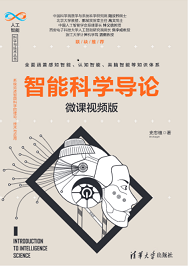
Intelligence science, which studies the essence and implementation technology of intelligence, is a frontier interdisciplinary subject created by brain science, cognitive science, artificial intelligence, etc. Brain science studies the mechanism of natural intelligence from the molecular level, cell level and behavioral level, establishes brain models, and reveals the essence of human brain; Cognitive science is a science that studies the process of human brain mental activities such as perception, learning, memory, thinking and consciousness; Artificial intelligence research uses artificial methods and technologies to imitate, extend and expand human intelligence and realize machine intelligence. Intelligent science should not only carry out functional simulation, but also study and explore new concepts, theories and methods of intelligence from the mechanism. The research of intelligence should not only use reasoning, from top to bottom, but also through learning, from bottom to top, both coexist. Intelligence science uses the method of comprehensive integration to study the intelligent nature and behavior of open systems.
Intelligence science is the essence of life science, the core of information science and technology, the frontier and commanding height of modern science and technology, involving the deep mysteries of natural science and touching the basic propositions of philosophy. Therefore, once a breakthrough is made in intelligence science, it will have a profound and huge impact on the national economy, social progress and national security. At present, intelligence science is in the transition period of methodology, the climax period of theoretical innovation and the pioneering period of large-scale application, full of original opportunities.
The rise and development of intelligence science marks that the research on human centered cognition and intelligent activities has entered a new stage. The research of intelligent science will enable human beings to understand and control themselves, and improve human knowledge and intelligence to an unprecedented level. The phenomenon of life is complex, many problems have not been well explained, and the content that can be learned from it is also large and multifaceted. How to extract the most important and critical problems and corresponding technologies from them has been the goal of many scientists for a long time. In order to solve many difficulties faced by mankind in the 21st century, such as the massive demand for energy, environmental pollution, resource depletion, population expansion and so on, it is not enough to rely solely on existing scientific achievements. We must learn from biology and find a new path for the development of science and technology. The research of intelligent science will establish a theoretical basis for the intelligent revolution, knowledge revolution and information revolution, and provide new concepts, new ideas and new ways for the development of intelligent systems.
Since entering the 21st century, the international community has attached great importance to the research of intelligence science and its related disciplines, such as brain science, neuroscience, cognitive science and artificial intelligence. On January 28, 2013, the EU launched its flagship "Human Brain Project". On April 2, 2013, the United States launched brain project. China is also actively preparing for the "brain science and brain like research project". In order to compete for the commanding height of high technology, the State Council officially released the "development plan for a new generation of artificial intelligence" on July 8, 2017, trying to take the lead in the new round of international science and technology competition.
This book briefly introduces the concepts and methods of intelligence science, absorbs the research results of brain science, cognitive science, artificial intelligence, information science, formal system, philosophy and other aspects, and comprehensively explores the properties and laws of human intelligence and machine intelligence. The book is divided into 14 chapters. Chapter 1 is the introduction, which introduces the scientific background and research content of the rise of intelligent science. Chapter 2 introduces the neurophysiological basis of intelligent science. Chapter 3 discusses the progress of neural computing. Chapter 4 discusses important mental models. Chapter 5 discusses perceptual intelligence, including vision and hearing. Chapter 6 discusses the theory of language cognition. Chapter 7 focuses on important learning theories and methods. Memory is the basis of thinking. Chapter 8 discusses the memory mechanism. Chapter 9 focuses on thinking forms and reasoning. Chapter 10 studies the development and cognitive structure of intelligence. Chapter 11 discusses the theory of emotion and emotion. Chapter 12 discusses the problem of consciousness. Chapter 13 introduces the progress of intelligent robot research. Chapter 14 introduces brain like intelligence and looks forward to the development roadmap of intelligence science.
The research work of this book has been supported by the National Key Basic Research and Development Program "Cognitive Computational Model of Brain Computer Collaboration" (no.2013cb329502), "Content Understanding and Semantic Representation of Unstructured Information (images)" (No. 2007cb311004); Support for NSFC key projects "Big Data Mining Based on Cloud Computing" (no.61035003), "Research on Intelligent Computing Model Based on Perceptual Learning and Language Cognition" (No.60435010), "New Theories and Methods of Web Search and Mining" (no.60933004); Support for the National 863 High-Tech Project "Massive Web Data Content Management, Analysis and Mining Technology and Large-scale Demonstration Application" (no.2012aa011003), "Software Autonomous Healing and Self Recovery Technology" (no.2007aa01z132); Tsinghua University Press has given great support to the publication of this book, and I would like to thank you.
This book can be used as a textbook for intelligence science courses for undergraduates, postgraduates and training courses of intelligence science and technology, artificial intelligence, computer science and technology, automation and other related majors in Colleges and universities, as well as for scientific and technological personnel engaged in intelligence science research and applications.
Intelligence science is an interdisciplinary subject at the forefront of research and development. Many concepts and theories need to be discussed. In addition, the author's level is limited and the writing time is short. Therefore, fallacies in the book are inevitable. Readers are urged to correct them.